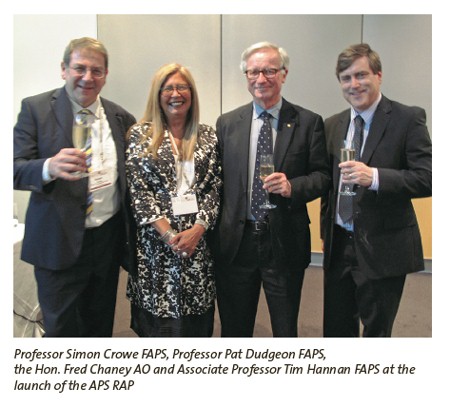The APS Reconciliation Action Plan (RAP) was launched at the APS Conference in Perth by the Hon. Fred Chaney AO, Board member of Reconciliation Australia and former Federal Minister for Aboriginal Affairs. Also launching the RAP was out-going President Professor Simon Crowe FAPS and Professor Pat Dudgeon FAPS as co-chairs of the APS RAP Working Group, and new President, Associate Professor Tim Hannan FAPS.
The gala launch of the APS RAP was attended by around 100 Conference delegates, many of whom had provided input into the development of this important document which formalises the APS commitment to reconciliation action to maximise psychology’s contribution to the social and emotional wellbeing and mental health of Indigenous Australians. The attendance was particularly impressive given that the launch took place during the afternoon tea break, on a Saturday afternoon immediately following the AFL Grand Final! Fred Chaney commented with amusement that this was the first launch he had attended where the champagne had been opened before the speeches.
The edited extracts below from Fred Chaney’s speech and that of the Tim Hannan are presented for members who were not able to be part of this important occasion.

The Hon. Fred Chaney AO, Reconciliation Australia
Thank you for what you as an organisation have done for some years in terms of getting the basics right. I have been close to these issues for a very long time, and there are critical issues that I still grapple with involving the psychology of some aspects of healing in the reconciliation process.
Firstly, I am really concerned that we often console rather than work to be empowering. It is good to console, but it is more important to empower. Secondly, I want to see pride as the basis of success in Aboriginal communities – seeing “I’m black, I’m proud”. Pride and a sense of confidence come out of true healing. I believe this is of profound importance, and I hope that as the result of the work of psychologists towards reconciliation in action we will have a chance to dialogue on this and do it better.
There are past failures we have had as a country in addressing Indigenous disadvantage and attempting to right the wrongs, failures that troubled me from when I was a teenager. However, it’s an old expression but true in this case – the past is a foreign country. Australia today is nothing like when I was a school boy, a student or a practising lawyer many, many years ago. So many elements of the Australian community are seeking to be part of the solution.
In participating in the reconciliation process, the APS is now part of a truly national movement for us to get this right. So thank you very much for the efforts you have made. We at Reconciliation Australia will be standing side by side with you, but we will be a critic if you fall off the case. I’m sure as psychologists you won’t do that, because I know some of the people who are involved in this.
Thank you for the fact that you have put so much work into developing this Reconciliation Action Plan, and I look forward to seeing the results of your work over the coming years.
Associate Professor Tim Hannan FAPS, APS President
This, the inaugural APS Reconciliation Action Plan, is a wonderful document and I commend and congratulate all of those who spent the years talking and doing all that was necessary to come to an understanding to produce this.
The Plan is a clear statement of the aspirations of our Society, to strive to address the inequities between Indigenous and non-Indigenous peoples in relation to emotional and social wellbeing. I recommend the document to all of you. In fact, you will not be able to renew your membership unless you have read this!
This Reconciliation Action Plan makes absolutely explicit the steps that we should take, must take and will take to work together to build respect, to build relationships and to build understanding between Indigenous and non-Indigenous Australians. The Plan contains explicit strategies, responsibilities, timelines and measurable targets against which we will be held.
I am utterly delighted that my very first action as APS President is to make very clear that I commit the Board and myself to unequivocally pursue these measurable targets. My hope is that this will be truly demonstrated when we report to Reconciliation Australia each year on our progress.
The APS RAP can be downloaded at http://www.psychology.org.au/About-Us/who-we-are/reconciliation-and-the-APS/reconciliation-action-plan